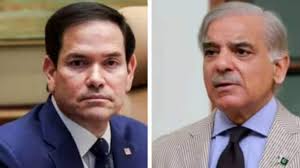US talks to Pakistan about promoting ‘durable peace between Israel and Iran’

In a diplomatic shift, the United States reached out to Pakistan to promote peace between Israel and Iran. This move came on June 26, 2025, during a phone call between US Secretary of State Marco Rubio and Pakistan’s Prime Minister Shehbaz Sharif.
The outreach follows a tense 12-day war between Israel and Iran. It marked one of the most dangerous flashpoints in recent years. As global leaders worked to ensure the ceasefire holds, the US saw value in involving Pakistan—one of the few nations with ties to both Washington and Tehran.
Why Pakistan Matters in This Equation
Pakistan might seem like an unusual choice. But it holds a unique position. It maintains working relations with the US and deep diplomatic ties with Iran.
Islamabad also acts as a channel for Iran’s interests in Washington, as it handles consular affairs for Tehran in the US. This gives Pakistan credibility as a neutral party, capable of backchannel negotiations.
Prime Minister Sharif said Pakistan supports dialogue over war. “The region cannot afford further conflict. We urge all parties to pursue peace,” he stated after the US call.
A Ceasefire on Fragile Ground
The recent ceasefire was brokered by the US after a rapid escalation. It began when Israel launched strikes on Iranian nuclear facilities. Iran responded by attacking a US base in Qatar. The US retaliated by targeting more Iranian sites.
Global fears of a full-scale war grew fast. The United Nations called for calm. Russia, China, and the European Union echoed similar warnings.
US President Donald Trump intervened and pushed both countries to stop hostilities. The result was a ceasefire after 12 days of violence. But experts believe it could break at any moment without a broader peace plan.
The US Strategy Behind Involving Pakistan
Washington’s decision to speak with Islamabad reflects a few key goals:
- Preventing Nuclear Escalation: The US wants to block Iran from gaining nuclear weapons. Diplomatic progress has stalled. Pakistan could help reopen dialogue.
- Avoiding a New War: The US is already stretched thin globally. Another Middle Eastern war could hurt its strategic focus.
- Using Neutral Channels: Pakistan is not directly involved in the Israel–Iran rivalry. That makes it a useful go-between.
Secretary Rubio said the US would welcome “any peaceful initiative that leads to long-term stability.” The State Department noted Pakistan’s “important diplomatic role” and its ability to “speak with both sides.”
Pakistan’s Peace Approach
Pakistan condemned both the Israeli strikes and the Iranian retaliation. It also criticized the US’s military response. The country urged all sides to practice restraint and engage in dialogue.
In his recent address to Parliament, Prime Minister Sharif said, “Wars only bring suffering. The only lasting solution is diplomacy. We are ready to help build peace.”
The Foreign Office released a formal statement. It stressed respect for international law and peaceful conflict resolution. “We urge all parties to avoid unilateral actions,” the statement read.
Pakistan’s call for calm has gained support from several Muslim-majority countries. Some have even urged Pakistan to act as a regional mediator.
What Lies Ahead
The idea of Pakistan helping Israel and Iran talk peace might have seemed unlikely a few months ago. But the current situation demands creative solutions.
Still, major obstacles remain. Israel sees Iran as a threat due to its nuclear activity and support for groups like Hezbollah. Iran accuses Israel of illegal aggression and insists on sanctions being lifted before any negotiations.
Can Pakistan help both countries take a step back? That remains to be seen. But its neutral position gives it a rare chance to offer solutions that others can’t.
A Moment of Possibility
In a time of rising global tensions, the US reaching out to Pakistan is a sign of hope. It suggests that even deep-rooted hostilities might soften through dialogue.
If Pakistan succeeds, it could reshape its role in global diplomacy. It would also bring fresh momentum to conflict resolution in a region long plagued by instability.
The road to peace is uncertain. But this new effort shows that diplomacy is not dead—and that bridges can still be built in the most unlikely places.






